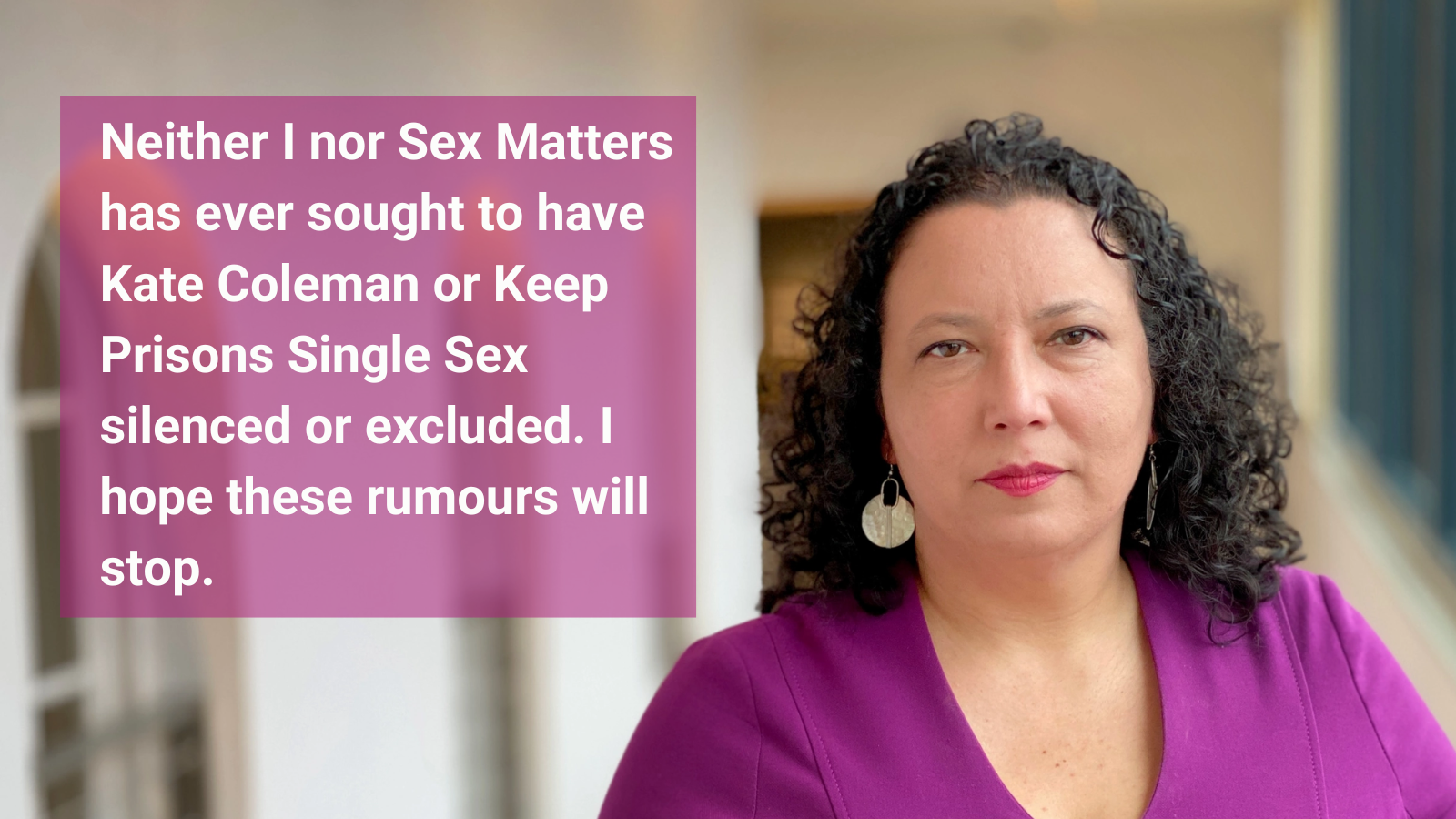Statement about rumours

After considerable thought the Keep Prisons Single Sex Campaign (KPSS) has decided to close down.
Rumours are circulating that the reason that the Keep Prisons Single Sex campaign is ceasing operations is because I, or Sex Matters, “cold-shouldered” Kate Coleman or arranged for her and her campaign to be excluded from Whitehall or Westminster meetings.
These rumours are false.
Neither I nor Sex Matters have any desire or power to have anyone excluded by officials, politicians or other groups.
I have been in direct message and email contact with Kate for several years. I have shared information, plans and drafts of publications with her, and have always invited her or KPSS to sign relevant joint letters with us. On some occasions she did, but mainly she did not – as is, of course, her right.
Sex Matters features KPSS and some of its reports on our website and I have promoted its work, and that of other organisations and groups, on social media.
Sex Matters is a small and hardworking organisation. We are not in the business of “gatekeeping” activism or briefing against other groups. We set out publicly what we believe, and our ideas and proposals. We do not attack those who pursue different strategies or tactics.
When we disagree on a point of law we say so publicly and explain why, because we think it is important that people understand the law, and that differences of opinion about the law are publicly debated.
We did this in relation to our campaign to make the Equality Act clear, because we disagreed with KPSS’s interpretation that sex and gender mean different things in law. We do not think that we can solve the conflation between sex and self-declared “gender identity” so simply, since GRCs give holders the right to be considered as members of the opposite sex for certain legal purposes.
We also disagreed with a legal opinion commissioned by FairCop with KPSS. That opinion concluded that a GRC gives a male police officer the right to search female detainees. We strongly disagree with this: a government-issued piece of paper cannot override women’s fundamental human rights. We think the opinion erred in law.
Most recently we disagreed on whether the legal precedent of “worthy of respect in a democratic society” is relevant case law for Northern Ireland. Kate said that since the Equality Act does not cover Northern Ireland, it was not relevant; I pointed out that my case drew on the human rights set out by the European Court of Human Rights (and brought into UK law in the Human Rights Act 1998). It is therefore an important precedent right across Europe.
We agree on much else and we valued Kate’s work.
It is hard to build relationships, get press coverage and make inroads to meet with parliamentarians and officials. Often when we have public success, it is the result of months of work behind the scenes, sometimes on our own but often with a range of groups.
On 1st September 2023 we organised an open letter to the Prime Minister on the campaign of violence against gender-critical women. As a result, we were invited to a roundtable meeting on 24th October 2023 with the Home Secretary, along with several other signatories of the letter.
I had invited Kate/KPSS, along with many other campaigners and campaign groups, to sign the letter. Many agreed but Kate declined.
We also wrote follow-up letters to the National Police Chiefs’ Council (NPCC) and the Association of Police and Crime Commissioners (APCC). These were co-signed with the Women’s Rights Network. As a result, we were invited to a meeting with the NPCC and APCC on 23rd April 2024.
On both occasions Kate Coleman complained on social media that she had not been invited. On both occasions, I made efforts to connect her with the officials we had met.
I also asked Kate in January whether her legal advisors would talk to the lawyers on our board concerning the legal differences of opinion between KPSS and Sex Matters. In April I suggested a meeting between us to resolve tensions and talk about how our organisations relate together. She rejected both of these approaches.
There is a serious and important job to do in challenging and defeating gender ideology. This is a David-and-Goliath fight between the brave and angry gender dissidents, and the organisations that have captured state institutions.
There are many different ways of approaching this fight. The strength of the movement comes from the whole ecosystem of campaigners and groups. It has achieved extraordinary things, mainly through the hard work of women, many of them anonymous.
Transactivists achieved the changes they wanted over decades. They took legal challenges, lobbied, worked with organisations and campaigned publicly. We fear it may take equally long to win back the ground for women’s rights, child safeguarding, the integrity of organisations and the rule of law. We will have to build sustainable, effective organisations, avoid burning out, work tenaciously and be resilient and resourceful. Frustration at the extent of the capture, the slow pace of incremental gains and the grinding experience of public denigration, discrimination and harassment take a toll on all of us.
Neither I nor Sex Matters will seek to tell other people or groups what approach they should take. We will continue to do what we think is most likely to succeed in defeating an evil ideology that is doing harm to children and vulnerable people, to women’s rights and to the institutions of democracy. And we will continue to work with other people and groups on points of agreement.
We are grateful to everyone who supports us and works with us, and applaud everyone who is challenging this ideology in whichever way they think best.
